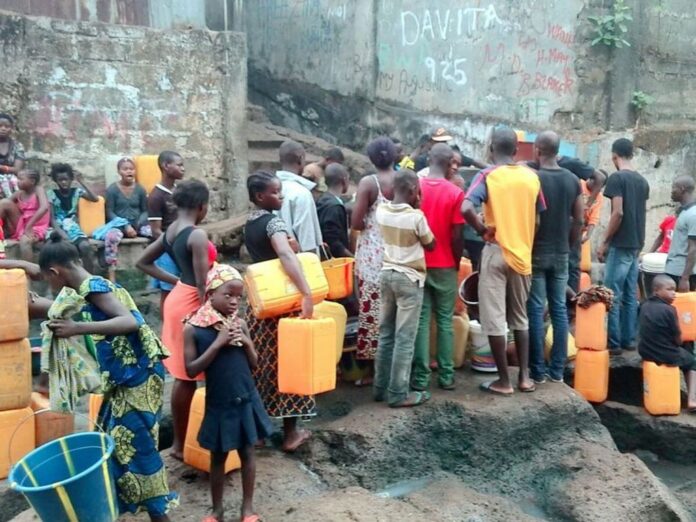A national park that provides clean water to Sierra Leone’s capital Freetown is under threat due to human activities, a UN report has said.
Water is a scarce resource in Freetown, the capital of Sierra Leone, where it is not unusual to see groups of youths gathered around water taps, jostling for turns to fill their buckets and jerrycans.
The struggle for clean water is oftentimes settled with the exchange of blows.
Deforestation in the West African nation could contribute to water shortages, according to the Reuters news agency, which cited a recently-released UN report.
The study called for close monitoring of forest coverage to protect the city’s main water sources, Reuters said.
How does deforestation affect the water supply?
Freetown is built on a forested peninsula, which is mostly made up of national parkland.
The water comes from reservoirs in the mountains — but deforestation causes rain to drain off the hillsides rather than seeping through roots into the soil and streams, depleting important groundwater sources.
Freetown was designed for 400,000 residents, but is home to about 1.2 million residents and, according to the World Bank, is on track to reach 2 million within the decade.
Locals often struggle to access clean drinking water, explained Brima Jabbie, who is recognized by the community as the person in charge of maintaining order at the water source.
“The tap starts running around 2 p.m., but sometimes it doesn’t until 4 p.m.,” another resident told DW.
“So we hang out there and if it doesn’t run on that day, we return home or take our buckets here to fetch water from this well,” Zainab Favour Mason, a nursing mother told of her struggles to buy the scarce water that has become expensive.
“We suffer in this area to access water. The tap starts running and within seconds, the supply is cut. We come to the water well, but they say unless we pay,” she added.
For pupils, like Fatmata Bundu taking a morning shower has become a luxury rather than a necessity.
“There are constraints for those of us going to school. It’s hard to even access water in the morning for bathing and domestic work,” Bundu told DW Freetown correspondent Claudia Anthony.
“The tap runs three days a week and sometimes it doesn’t for a whole week. When we’re late for school, we’re punished,” Bundu said, adding that her parents accuse her of not being patient enough to fetch water before she goes to school.
Bundu’s concerns don’t differ from Zino Thorpe’s, a primary school teacher and parent.
“As citizens, it’s heartbreaking to see us suffer to access water and as a result, many people like pupils and nursing mothers suffer. The tap doesn’t run on time, when they choose, they open it at night when everyone has gone to sleep,” Thorpe told DW.
What is being done to help?
To address water shortages for Freetown residents, several NGOs have set up the Western Area Peninsula Water Fund (WAPWF) to secure a sustainabe water supply for future generations.
The water fund will also protect the water sources in a forest and national park located west of the Freetown.
Several local laws guard natural water sources in this forest. But within this green belt, homes schools, and unregulated infrastructures have been erected, further aggravating an already dire situation.
However, Sierra Leone’s Minister for Water Resources Sao-Kpato Hannah Max-Kyne warned of demolitions of illegal structures in protected areas.
“Those who have violated the law will be brought to book … If you build your house in the waterway it will be brought down because if the dam bursts it would be a catastrophe,” Max-Kyne emphasized.
“The issue of deforestation on the Western Area peninsula is tragic, worrying, and alarming,” said Sierra Leone’s Environment Minister Jiwoh Abdulai.
“Enforcing the laws and policies is a major challenge,” he said.
Claudia Anthony in Freetown contributed reporting
Story by Deutsche Welle






















